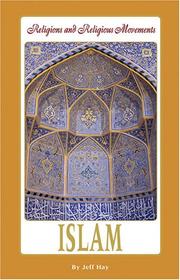| Listing 1 - 2 of 2 |
Sort by
|

ISBN: 0737725710 Year: 2006 Publisher: Farmington Hills, MI Greenhaven Press
Abstract | Keywords | Export | Availability | Bookmark
 Loading...
Loading...Choose an application
- Reference Manager
- EndNote
- RefWorks (Direct export to RefWorks)
origins of Islam --- Muhammad --- Judaism --- the Middle East --- Apostacy --- beliefs and practices --- saints --- Mecca --- pilgrimage --- Islamic clergy --- the Unity of God --- Islamic politics --- Ramadan --- Morocco --- Muslim mystics --- India --- Hinduism --- Europe --- Muslim immigrants --- gender issues --- United States --- radicalism --- terrorism --- Jihad --- ideology --- secularism --- violence --- militant Islam
Book
ISBN: 1479873632 Year: 2023 Publisher: New York : New York University Press,
Abstract | Keywords | Export | Availability | Bookmark
 Loading...
Loading...Choose an application
- Reference Manager
- EndNote
- RefWorks (Direct export to RefWorks)
Charts the development of progressive Christianity’s engagement with modern science, historical criticism, and liberal humanismChristians who have doubts about the existence of God? Who do not believe in the divinity of Jesus? Who reject the accuracy of the Bible? The New Heretics explores the development of progressive Christianity, a movement of Christians who do not reject their identity as Christians, but who believe Christianity must be updated for today’s times and take into consideration modern science, historical criticism, and liberal humanism.Drawing on three years of ethnographic fieldwork in North America, Rebekka King focuses on testimonies of deconversion, collective reading practices, and the ways in which religious beliefs and practices are adapted to fit secular lives. King introduces the concept of “lived secularity” as a category with which to examine the ways in which religiosity often is entangled with and subsumed by secular identities over and against religious ones. This theoretical framework provides insight into the study of religious and cultural hybridity, new emerging groups such as “the nones,” atheism, religious apostasy, and multi-religious identities. The New Heretics pays close attention to the ways that progressive Christians understand themselves vis-à-vis a conservative or fundamentalist Christian “other,” providing context concerning the presumed divide between the religious right and the religious left. King shows that while it might be tempting to think of progressive Christians as atheists, there are religious and moral dimensions to their disbelief. For progressive Christians the act of questioning and rejecting God—alongside other theological tenets—is framed as a moral activity. Ultimately, the book showcases the importance of engaging with the ethics of belief in understanding contemporary Christianity.
Liberalism --- Liberalism (Religion) --- Christianity --- Religious aspects --- Christianity. --- Anthropology of Christianity. --- Anthropology of Religion. --- Apostacy. --- Atheism. --- Baby-Boomer. --- Bible Study. --- Biblical Criticism. --- Biblical Reception. --- Choice. --- Collective Reading. --- Congregational Dynamics. --- Contested Spaces. --- Conviction. --- Creationism. --- Deconversion. --- Disbelief. --- Discourse Analysis. --- Eschatology. --- Ethics of Belief. --- Ethnography of Reading. --- Ethnography. --- Future. --- Gretta Vosper. --- Heresy Trial. --- Heretics. --- Heritage. --- Leadership. --- Lived Secularity. --- Mainline Christianity. --- Membership. --- Middle-Class. --- Nones. --- North American religions. --- Oral History. --- Outliers. --- Popular Theology. --- Progressive Christianity. --- Proximate Other. --- Purification. --- Religious Narratives. --- Rewriting the Bible. --- Secularity and Secularism. --- Simulacrum. --- Sincerity. --- Skepticism. --- Temporal Language. --- Textual Ideologies. --- United Church of Canada.
| Listing 1 - 2 of 2 |
Sort by
|

 Search
Search Feedback
Feedback About
About Help
Help News
News